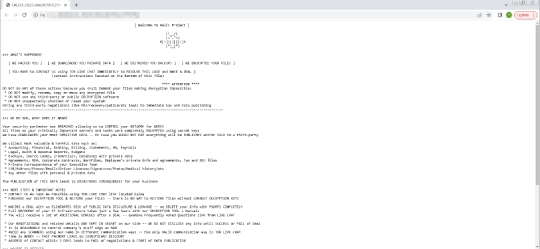Ransom.Win64.RELICPROJ.A
UDS:Trojan-Ransom.Win32.Relic.a (Kaspersky)
Windows


Threat Type: Ransomware
Destructiveness: No
Encrypted: Yes
In the wild: Yes
OVERVIEW
This Ransomware arrives on a system as a file dropped by other malware or as a file downloaded unknowingly by users when visiting malicious sites.
It drops files as ransom note. It avoids encrypting files with the following file extensions.
TECHNICAL DETAILS
Arrival Details
This Ransomware arrives on a system as a file dropped by other malware or as a file downloaded unknowingly by users when visiting malicious sites.
Other System Modifications
This Ransomware deletes the following files:
- d:\$recyclebin\desktop.ini
- d:\$recyclebin\$I63O705.txt
- D:\$RECYCLE.BIN\$R63O705.txt
- D:\$RECYCLE.BIN\$RJRKOLR\bridgelist.h
- D:\$RECYCLE.BIN\$RJRKOLR\dbghelp\dbghelp.h
- D:\$RECYCLE.BIN\$RJRKOLR\lz4\lz4.h
- D:\$RECYCLE.BIN\$RJRKOLR\TitanEngine\TitanEngine.h
- D:\$RECYCLE.BIN\$RJRKOLR\TitanEngine\TitanEngine_x64.a
- D:\$RECYCLE.BIN\$RJRKOLR\TitanEngine\TitanEngine_x64.lib
- D:\$RECYCLE.BIN\$RJRKOLR\XEDParse\XEDParse_x64.a
- D:\$RECYCLE.BIN\$RJRKOLR\_plugin_types.h
- D:\$RECYCLE.BIN\$RJRKOLR\_dbgfunctions.h
- D:\$RECYCLE.BIN\$RJRKOLR\_plugin_types.h
- D:\$RECYCLE.BIN\$RSYAN0F\translations\x64dbg_{language}.qm
- D:\$RECYCLE.BIN\$RSYAN0F\x32\asmjit.dll
- D:\$RECYCLE.BIN\$RSYAN0F\x32\dbghelp.dll
- D:\$RECYCLE.BIN\$RSYAN0F\x32\DeviceNameResolver.dll
- D:\$RECYCLE.BIN\$RSYAN0F\x32\GleeBug
- D:\$RECYCLE.BIN\$RSYAN0F\x32\Scylla.dll
Process Termination
This Ransomware terminates the following processes if found running in the affected system's memory:
- sql
- oracle
- dbeng50
- postgres
- isqlplussvc
- toad
- git
- subversion
- svn
- logmein
- teamviewer
- vnc
- tinyvnc
- backup
- s3
- onedrive
- azure
- outlook
- thunderbird
- firefox
- chrome
- chromium
- winword
- powerpnt
- wordpad
- excel
- msaccess
- onenote
- outlook
- visio
- java
- putty
- git
- cadence
- cad
- allegro
- jira
- processmonitor
- regedit
- ocssd
- procexplorerv
- regedt32
- procexplorerv
- procdump
- mmc
- programaudit
- kaseya
- steam
Information Theft
This Ransomware gathers the following data:
- Hostname
- Username
- OS Version
- Service Configurations
Other Details
This Ransomware does the following:
- It uses wevtutil.exe to clear event logs of each segment of its malicious routine.
- Before encryption, it checks every available folder in available local drives if there are files inside it.
- It retrieves service configurations that are related in managing Windows OS, network connectivity, security, and multimedia:
- audiosvc
- bdesvc
- comsysapp
- cscservice
- dcomlaunch
- dhcp
- dnscache
- dot3svc
- eaphost
- efs
- ehrecvr
- ehsched
- eventlog
- eventsystem
- fax
- fdphost
- googlechromeelevationservice
- gpsvc
- gupdate
- gupdatem
- hidserv
- hkmsvc
- homegroupprovider
- idsvc
- ikeext
- ipbusenum
- iphlpsvc
- keyiso
- ktmrm
- lanmanserver
- lanmanworkstation
- lltdsvc
- mmcss
- netlogon
- netman
- netmsmqactivator
- nettcpactivator
- nettcpportsharing
- p2psvc
- plugplay
- power
- protectedstorage
- remoteregistry
- sharedaccess
- termservice
- vaultsvc
- wbengine
- wcncsvc
- wdiservicehost
- wdisystemhost
- webclient
Ransomware Routine
This Ransomware appends the following extension to the file name of the encrypted files:
- {original filename}.{original extension}.306624E70F2C279F
It drops the following file(s) as ransom note:
- {encrypted directory}\UNLOCK_FILES.306624E70F2C279F.HTML
- {available drives}\UNLOCK_FILES.306624E70F2C279F.HTML

It avoids encrypting files with the following file extensions:
- .drv
- .msc
- .dll
- .lock
- .sys
- .msu
- .lnk
- .search-ms
SOLUTION
Step 1
Trend Micro Predictive Machine Learning detects and blocks malware at the first sign of its existence, before it executes on your system. When enabled, your Trend Micro product detects this malware under the following machine learning name:
- Troj.Win32.TRX.XXPE50FFF075
Step 2
Before doing any scans, Windows 7, Windows 8, Windows 8.1, and Windows 10 users must disable System Restore to allow full scanning of their computers.
Step 3
Search and delete these files
- {encrypted directory}\UNLOCK_FILES.306624E70F2C279F.HTML
- {available drives}\UNLOCK_FILES.306624E70F2C279F.HTML
Step 4
Scan your computer with your Trend Micro product to delete files detected as Ransom.Win64.RELICPROJ.A. If the detected files have already been cleaned, deleted, or quarantined by your Trend Micro product, no further step is required. You may opt to simply delete the quarantined files. Please check the following Trend Micro Support pages for more information:
Did this description help? Tell us how we did.



